综合英语二答案【上册】
- 格式:docx
- 大小:82.26 KB
- 文档页数:27
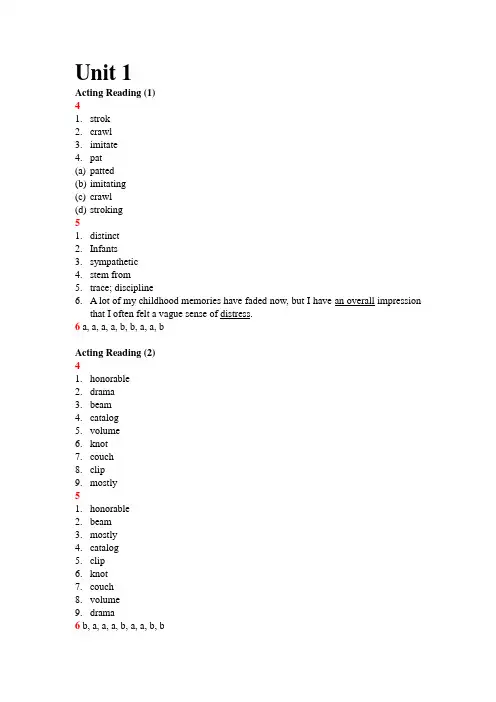
Unit 1Acting Reading (1)41.strok2.crawl3.imitate4.pat(a)patted(b)imitating(c)crawl(d)stroking51.distinct2.Infants3.sympathetic4.stem from5.trace; discipline6. A lot of my childhood memories have faded now, but I have an overall impressionthat I often felt a vague sense of distress.6 a, a, a, a, b, b, a, a, bActing Reading (2)41.honorable2.drama3.beam4.catalog5.volume6.knot7.couch8.clip9.mostly51.honorable2.beam3.mostly4.catalog5.clip6.knot7.couch8.volume9.drama6 b, a, a, a, b, a, a, b, bLanguage in use11.immigrants2.contestants3.vacancies4.consultancy5.defendant6.hesitancy7.attendant8.pregnancy9.assistant21.You misunderstand it.2.You have misplaced it.3.It is misfortune.4.You have made a misjudgment.5.You have been misinformed about it.31.By the time I arrived at the party, almost everyone had already left.2.By the time children are two, they have known about 100 words.3.By the time he realized what was happening, it had been too late to ask for help.4.By the time I finally got my degree, most of my friends already had jobs.5.By the time they leave primary school, children have learnt a lot of useful skills.6.By the time Courtney finished writing the essay, the deadline had already passed. 41.The old man shouted at me, as if / as though it were me who had made themistake.2.The girl started crying, as if / as though it were she who had fallen over.3.Lucy stood at the door welcoming everyone, as if /as though it were her party.4.Sylvia closed the door of David’s room, as if / as though it were him that wasmaking the noise.51.这种所谓的运动神经模仿就是“同感”的原始技术含义,而“同感”这个词于20世纪20年代由美国心理学家E.B.铁钦纳首次使用。
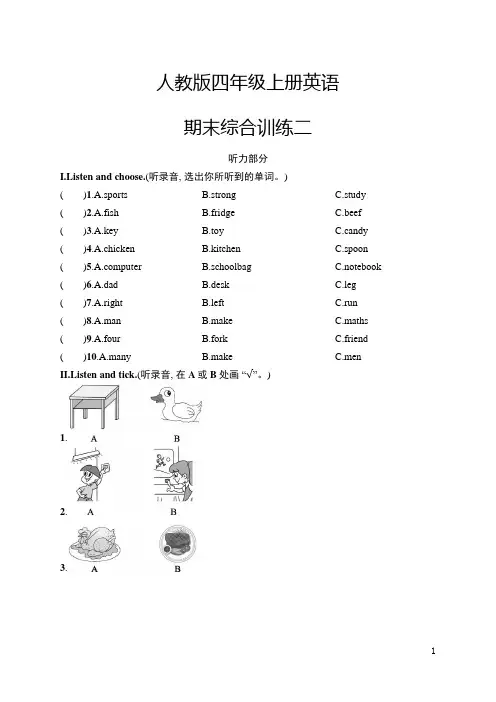
人教版四年级上册英语期末综合训练二听力部分I.Listen and choose.(听录音,选出你所听到的单词。
)()1.A.sports B.strong C.study ()2.A.fish B.fridge C.beef ()3.A.key B.toy C.candy ()4.A.chicken B.kitchen C.spoon ()puter B.schoolbag C.notebook ()6.A.dad B.desk C.leg()7.A.right B.left C.run()8.A.man B.make C.maths ()9.A.four B.fork C.friend ()10.A.many B.make C.menII.Listen and tick.(听录音,在A或B处画“√”。
)1.2.3.4.5.III.Listen and match.(听录音,连线。
)(10分)IV.Listen and choose.(听录音,选答语。
)()1.A.No. B.That’s right. C.Thank you.()2.A.I can see 6 books. B.There are 6 books. C.It’s my book. ()3.A.I’d like some noodles. B.It’s yellow. C.Yes, it is.()4.A.He’s a doctor. B.He’s tall and thin. C.This is my father. ()5.A.Yes, she is. B.Yes, he is. C.Yes, it is.笔试部分V.Look and write.(看图片,写单词。
)(10分)1.This is my brother. He is a .2.I’d like some for dinner.3.—Hi, Lingling. What’s your uncle’s job?—He’s a .4.Mum, can I have some now?5.Welcome to my .VI.Read and judge.(读单词,判断是否同类。
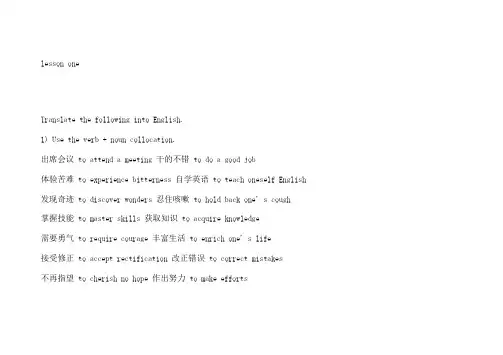
lesson oneTranslate the following into English.1)Use the verb + noun collocation.出席会议to attend a meeting 干的不错to do a good job体验苦难to experience bitterness 自学英语to teach oneself English 发现奇迹to discover wonders 忍住咳嗽to hold back one' s cough掌握技能to master skills 获取知识to acquire knowledge需要勇气to require courage 丰富生活to enrich one' s life接受修正to accept rectification 改正错误to correct mistakes不再指望to cherish no hope 作出努力to make efforts2)Use the "useful expressions w .1.新造的大桥坍塌了,一名工程师和两名地方官员为此受到刑事起诉。
The collapse of the big newly-built bridge led tj criminal prosecution against an engineer and two local government officials.2.他工作了一天,午饭都没动。
He worked all day, leaving his lunch untouched.3.经常性的体育运动使学生身体强壮,更好的适应学习,决不是浪费时间。
Far fron| being a waste of time, regular sports activities make students physically strong and deal with their study better.4.在海洋世界公园,海豹和海豚能够表演各种技巧,逗的小观众们乐不可支。
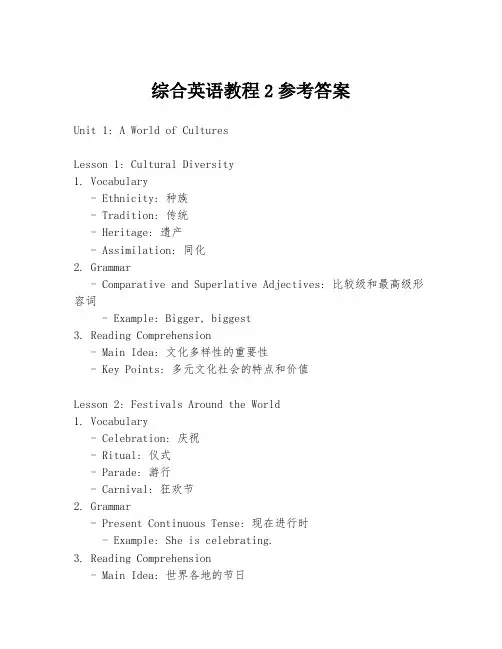
综合英语教程2参考答案Unit 1: A World of CulturesLesson 1: Cultural Diversity1. Vocabulary- Ethnicity: 种族- Tradition: 传统- Heritage: 遗产- Assimilation: 同化2. Grammar- Comparative and Superlative Adjectives: 比较级和最高级形容词- Example: Bigger, biggest3. Reading Comprehension- Main Idea: 文化多样性的重要性- Key Points: 多元文化社会的特点和价值Lesson 2: Festivals Around the World1. Vocabulary- Celebration: 庆祝- Ritual: 仪式- Parade: 游行- Carnival: 狂欢节2. Grammar- Present Continuous Tense: 现在进行时- Example: She is celebrating.3. Reading Comprehension- Main Idea: 世界各地的节日- Key Points: 不同节日的起源和庆祝方式Unit 2: The EnvironmentLesson 1: Climate Change1. Vocabulary- Emission: 排放- Greenhouse effect: 温室效应- Sustainability: 可持续性- Renewable: 可再生的2. Grammar- Passive Voice: 被动语态- Example: The gases are released by factories.3. Reading Comprehension- Main Idea: 气候变化的影响- Key Points: 气候变化的原因和可能的解决方案Lesson 2: Protecting Our Planet1. Vocabulary- Conservation: 保护- Biodiversity: 生物多样性- Deforestation: 森林砍伐- Recycling: 回收2. Grammar- Modal Verbs: 情态动词- Example: We should recycle more.3. Reading Comprehension- Main Idea: 保护地球的重要性- Key Points: 保护环境的方法和措施Unit 3: Technology and SocietyLesson 1: The Digital Age1. Vocabulary- Innovation: 创新- Cyberspace: 网络空间- Artificial Intelligence: 人工智能- Virtual Reality: 虚拟现实2. Grammar- Future Simple Tense: 一般将来时- Example: Robots will do more tasks.3. Reading Comprehension- Main Idea: 数字时代的技术发展- Key Points: 技术进步对社会的影响Lesson 2: Social Media Impact1. Vocabulary- Networking: 社交网络- Influencer: 影响者- Privacy: 隐私- Viral: 病毒式传播2. Grammar- Conditional Sentences: 条件句- Example: If you post a video, it might go viral.3. Reading Comprehension- Main Idea: 社交媒体对社会的影响- Key Points: 社交媒体的利与弊Unit 4: Health and LifestyleLesson 1: Healthy Eating1. Vocabulary- Nutrient: 营养素- Diet: 饮食- Organic: 有机的- Balanced: 平衡的2. Grammar- Gerunds and Infinitives: 动名词和不定式 - Example: Eating healthy is important.3. Reading Comprehension- Main Idea: 健康饮食的重要性- Key Points: 健康饮食的建议和指导Lesson 2: Exercise and Fitness1. Vocabulary- Cardiovascular: 心血管的- Yoga: 瑜伽- Aerobic: 有氧运动- Endurance: 耐力2. Grammar- Present Perfect Tense: 现在完成时- Example: I have exercised for an hour.3. Reading Comprehension- Main Idea: 运动与健康- Key Points: 运动的好处和不同类型的运动Unit 5: Education and CareerLesson 1: Lifelong Learning1. Vocabulary- Curriculum: 课程- Skill: 技能- Competency: 能力- Seminar: 研讨会2. Grammar- Adverbial Clauses of Time: 时间状语从句- Example: After I graduated, I continued learning.3. Reading Comprehension- Main Idea: 终身学习的重要性- Key Points: 终身学习的好处和方法Lesson 2: Career Development1. Vocabulary- Resume: 简历- Interview: 面试- Networking: 建立联系- Promotion: 晋升2. Grammar- Reported Speech: 间接引语- Example: He said that he wanted a promotion.3. Reading Compreh。
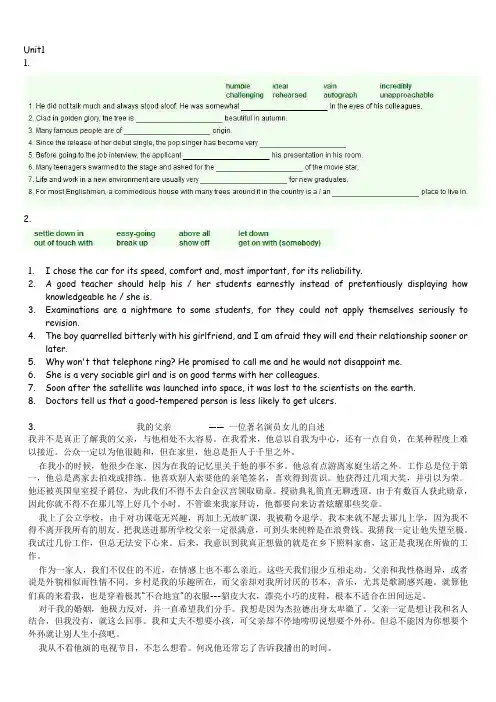
Unit11.2.1.I chose the car for its speed, comfort and, most important, for its reliability.2. A good teacher should help his / her students earnestly instead of pretentiously displaying howknowledgeable he / she is.3.Examinations are a nightmare to some students, for they could not apply themselves seriously torevision.4.The boy quarrelled bitterly with his girlfriend, and I am afraid they will end their relationship sooner orlater.5.Why won't that telephone ring? He promised to call me and he would not disappoint me.6.She is a very sociable girl and is on good terms with her colleagues.7.Soon after the satellite was launched into space, it was lost to the scientists on the earth.8.Doctors tell us that a good-tempered person is less likely to get ulcers.3. 我的父亲——一位著名演员女儿的自述我并不是真正了解我的父亲,与他相处不太容易。
在我看来,他总以自我为中心,还有一点自负,在某种程度上难以接近。
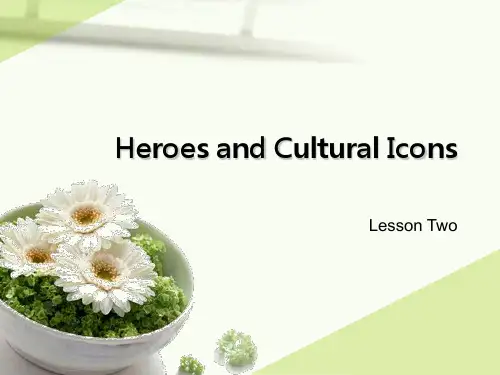
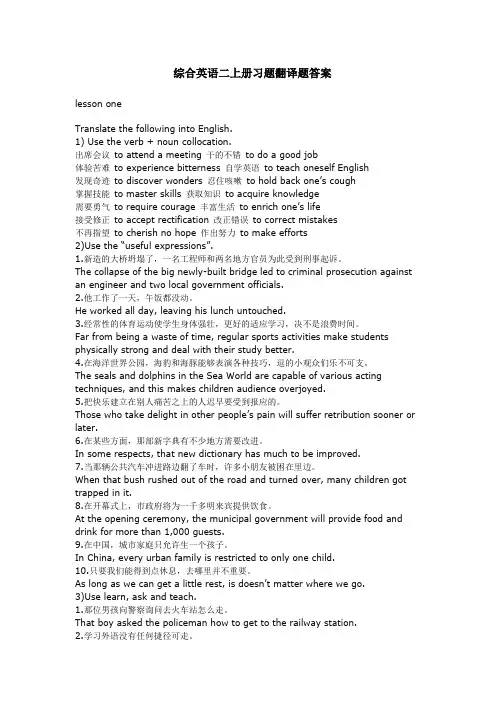
综合英语二上册习题翻译题答案lesson oneTranslate the following into English.1) Use the verb + noun collocation.出席会议to attend a meeting 干的不错to do a good job体验苦难to experience bitterness 自学英语to teach oneself English发现奇迹to discover wonders 忍住咳嗽to hold back one’s cough掌握技能to master skills 获取知识to acquire knowledge需要勇气to require courage 丰富生活to enrich one’s life接受修正to accept rectification 改正错误to correct mistakes不再指望to cherish no hope 作出努力to make efforts2)Use the “useful expressions”.1.新造的大桥坍塌了,一名工程师和两名地方官员为此受到刑事起诉。
The collapse of the big newly-built bridge led to criminal prosecution against an engineer and two local government officials.2.他工作了一天,午饭都没动。
He worked all day, leaving his lunch untouched.3.经常性的体育运动使学生身体强壮,更好的适应学习,决不是浪费时间。
Far from being a waste of time, regular sports activities make students physically strong and deal with their study better.4.在海洋世界公园,海豹和海豚能够表演各种技巧,逗的小观众们乐不可支。
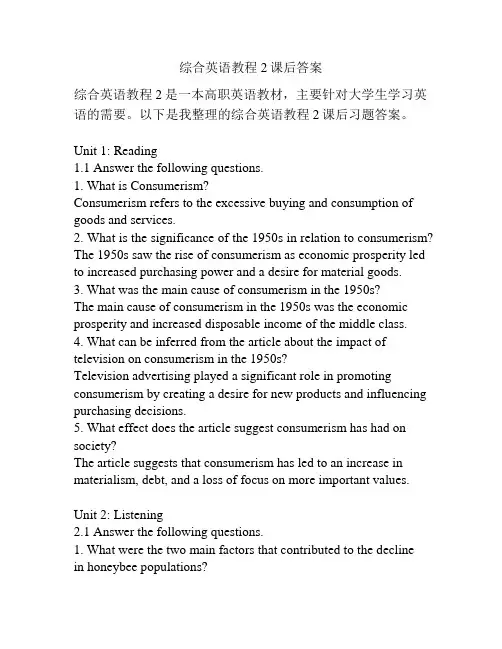
综合英语教程2课后答案综合英语教程2是一本高职英语教材,主要针对大学生学习英语的需要。
以下是我整理的综合英语教程2课后习题答案。
Unit 1: Reading1.1 Answer the following questions.1. What is Consumerism?Consumerism refers to the excessive buying and consumption of goods and services.2. What is the significance of the 1950s in relation to consumerism? The 1950s saw the rise of consumerism as economic prosperity led to increased purchasing power and a desire for material goods.3. What was the main cause of consumerism in the 1950s?The main cause of consumerism in the 1950s was the economic prosperity and increased disposable income of the middle class.4. What can be inferred from the article about the impact of television on consumerism in the 1950s?Television advertising played a significant role in promoting consumerism by creating a desire for new products and influencing purchasing decisions.5. What effect does the article suggest consumerism has had on society?The article suggests that consumerism has led to an increase in materialism, debt, and a loss of focus on more important values. Unit 2: Listening2.1 Answer the following questions.1. What were the two main factors that contributed to the declinein honeybee populations?The two main factors are habitat loss and exposure to pesticides. 2. What is colony collapse disorder (CCD)?Colony collapse disorder is the phenomenon where worker honeybees disappear from the hive, leading to the collapse of the colony.3. How does the loss of honeybee populations affect the environment?Honeybees play a crucial role in pollinating plants, so the loss of honeybee populations can have a significant impact on the environment, including reduced crop yields and a decrease in biodiversity.4. What actions are being taken to address the decline in honeybee populations?Actions being taken include reducing pesticide use, creating honeybee-friendly habitats, and implementing conservation measures to protect honeybee populations.Unit 3: Speaking3.1 Discuss the following questions.1. What do you know about global warming?2. What impact do you think global warming will have on the environment and society?3. What actions do you think individuals and governments should take to address global warming?Unit 4: Writing4.1 Write a paragraph summarizing the main points of the reading passage "The Dangers of Plastic Pollution".The article highlights the dangers of plastic pollution, particularly in oceans and marine life. It discusses how plastic waste, especiallysingle-use plastics like straws and bags, end up in the ocean and harm marine animals. The article also mentions the long-term effects of plastic pollution on ecosystems and human health. It concludes by emphasizing the need to reduce plastic use and promote recycling as a way to combat plastic pollution.These are just a few examples of the answers to the exercises in the Integrated English Course 2 workbook. It's important to note that answers may vary depending on individual interpretations, so it is always recommended to refer to the answer key provided by the textbook or consult with the teacher for the most accurate answers.。
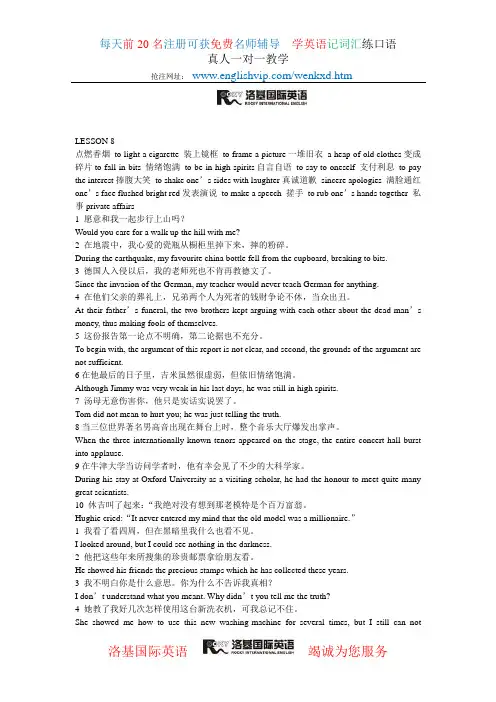
LESSON 8点燃香烟to light a cigarette 装上镜框to frame a picture一堆旧衣a heap of old clothes变成碎片to fall in bits 情绪饱满to be in high spirits自言自语to say to oneself 支付利息to pay the interest捧腹大笑to shake one’s sides with laughter真诚道歉sincere apologies 满脸通红one’s face flushed bright red发表演说to make a speech 搓手to rub one’s hands together 私事private affairs1 愿意和我一起步行上山吗?Would you care for a walk up the hill with me?2 在地震中,我心爱的瓷瓶从橱柜里掉下来,摔的粉碎。
During the earthquake, my favourite china bottle fell from the cupboard, breaking to bits.3 德国人入侵以后,我的老师死也不肯再教德文了。
Since the invasion of the German, my teacher would never teach German for anything.4 在他们父亲的葬礼上,兄弟两个人为死者的钱财争论不休,当众出丑。
At their father’s funeral, the two brothers kept arguing with each other about the dead man’s money, thus making fools of themselves.5 这份报告第一论点不明确,第二论据也不充分。
To begin with, the argument of this report is not clear, and second, the grounds of the argument are not sufficient.6在他最后的日子里,吉米虽然很虚弱,但依旧情绪饱满。
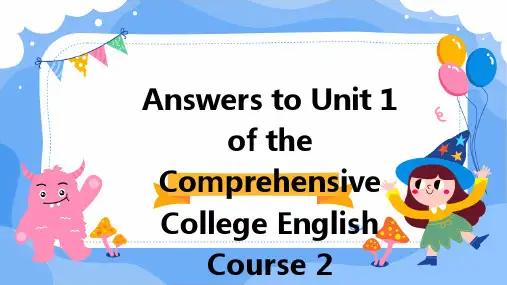
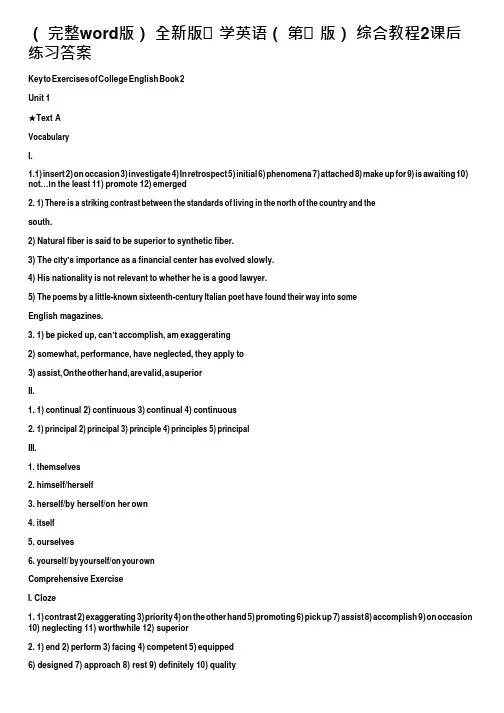
(完整word版)全新版⼤学英语(第⼤版)综合教程2课后练习答案Key t o Exercises o f C ollege English B ook 2Unit 1★Text AVocabularyI.1.1) insert 2) on occasion 3) investigate 4) In retrospect 5) initial 6) phenomena 7) attached 8) make up for 9) is awaiting 10) not…in the least 11) promote 12) emerged2. 1) There is a striking contrast between the standards of living in the north of the country and thesouth.2) Natural fiber is said to be superior to synthetic fiber.3) The city’s importance as a financial center has evolved slowly.4) His nationality is not relevant to whether he is a good lawyer.5) The poems by a little-known sixteenth-century Italian poet have found their way into someEnglish magazines.3. 1) be picked up, can’t accomplish, am exaggerating2) somewhat, performance, have neglected, they apply to3) assist, O n t he other h and, a re v alid, a s uperiorII.1. 1) continual 2) continuous 3) continual 4) continuous2. 1) principal 2) principal 3) principle 4) principles 5) principalIII.1. themselves2. himself/herself3. herself/by herself/on her own4. itself5. ourselves6. yourself/ by yourself/on your ownComprehensive ExerciseI. Cloze1. 1) contrast 2) exaggerating 3) priority 4) on the other hand 5) promoting 6) pick up 7) assist 8) accomplish 9) on occasion 10) neglecting 11) worthwhile 12) superior2. 1) end 2) perform 3) facing 4) competent 5) equipped6) designed 7) approach 8) rest 9) definitely 10) qualityII. Translation1.1) It takes an enormous amount of courage to make a departure from the tradition.2) Tom u sed to be very shy, but this time he was bold enough to give a performance in front o fa large audience.3) Many educators think it desirable to foster the creative spirit in the child at an early age.4) Assuming (that) this painting really is a masterpiece, do you think it’s worthwhile tobuy/purchase it?5) If the data is statistically valid, it will throw light on the problem we are investigating.2. To improve our English, it is critical to do more reading, writing, listening and speaking.Besides, learning by heart as many well-written essays as possible is also very important.Without an enormous store of good English writing in your head you cannot express yourself freely in English. It is also helpful to summarize our experience as we go along, for in so doing, we can figure out which way of learning is more effective and will produce the most desirable result. As long as we keep working hard on it, we will in due course accomplish the task of mastering English.★Text BComprehension check: c c d a c bLanguage Practice1.g h e c f a b d2.1) adopt 2) account 3) from your point of view 4) ended up 5) furthermore 6) fund7) annual 8) keeping track of 9) pace 10) intends11) perspective 12) deviseUnit 2★Text AVocabularyI. 1. 1) abrupt 2) emotional 3) bless 4) wear and tear 5) dated 6)consequences 7)seemingly 8) in contrast to 9) Curiosity 10) genuine11) primarily 12) sentiments2. 1) W hen you a re c onfronted with m ore t han o ne p roblem, t ry t o s olve t he e asiestone first.2) Water is vital to the existence of all forms of life.3) There is still some confusion among the students about what to do after classto follow up on the subject.4) As a person of s imple living habits, h e needs nothing more than a job and anapartment to be happy.5) It tickled him to think that she’d come to as his advice.3. 1) a lingering, fabricating, s entiments2) fill out, every item, vital, consequences3) be denied, tangible, cherish, attainII.1.It’s a long trip and will take us five hours by bus.2.She arrived early and took a front row seat.3. Don’t take me for a f ool.4. It takes a lot of imagination to fabricate such a story.5. My u ncle w ill t ake m e (along on h is t rip) t o t he Arctic t his s ummer.6.He took the dinner plate I passed to him.7.Kevin took second prize in the weight-lifting competition.8.If you don’t take my advice, you will regret it.III.1. hanging2. to give3. to return4. being praised5. not having written6. to say7. to open8. being helpedComprehensive ExerciseI.1. 1) well-off/affluent 2) dated 3) falling into 4) bracket 5) deny6) tangible 7) pursuit 8) cherishes 9) out of place 10) abrupt11) focus 12) donations2. 1) consume 2) fueled 3) annual 4) plain 5) physically 6) security7) indicates 8) equally 9) traditional 10) followsII. Translation1.1) The company denied that its donations had a commercial purpose.2) Whenever he was angry, he would begin to stammer slightly.3) Education is the most cherished tradition in our family. That’s why my parents never took me to dinner at expensive restaurants, but sent me to the best private school.4) Shortly after he recovered from the surgery, he lost his job and thus had to go through another difficult phase of his life.5) In contrast to our affluent neighbors, my parents are rather poor, but they have always tried hard to meet our minimal needs.2. With more and more donations coming in, our university will be much better offfinancially next y ear. W e w ill thus b e a ble t o focus o n t he most i mportant t ask that w e, e ducators, m ust t ake on: t o e ncourage students to attain their scholarly/academic goals, to train them to be dependable and responsible individuals, to prepare them for the life ahead, and to guide them in their pursuit of spiritual as well as material satisfaction.★Text BComprehension Check: b b d c d dLanguage Practice1. f c g e b a h d2.1) stunned 2) hold (fast) to 3) folks 4) generosity 5) discount 6) liable7) ranks 8) on the run 9) make up 10) blends in 11) by all accounts 12)comes into contact withUnit 3★Text AVocabularyI.1.1) typical 2)dumb 3) junior 4) glorious 5) welfare 6)came over 7) interference8) f ading 9) narrowed down 10) frank 11)schemes 12) at any rate2. 1) The Security council consists of five generals and four police officers.2) The new hotel will be in a location overlooking the lake.3) I was humiliated by her comments about my family background in front of so many people.4) Do you have any proof that it was Henry who stole the computer?5) the boy was exhausted after the long cycle ride.3. 1) hysterical; was handed down; should have known better than2) twisted, over and over, talented son3) patience, not to keep him in suspense, assured, repeatedlyII.1. adequate2. anxious3. certain4. content5. crazy6. likely7. fortunate8. keen III.1. be admitted2. live3. be postponed4. buy5. be banned6. be Comprehensive ExerciseI. 1. 1) typical 2) welfare 3) constant 4) frank 5) talent 6) dumb7) know better than that 8) repeatedly 9) dread 10) interference 11) bet 12) assure2. 1) despite 2) really 3) same 4) contact 5) admitted 6) attempt7) not 8) tend 9) different 10) mannerII. Translation1. 1) Have scientists found proof of water on Mars?2) The planning committee has narrowed down the possible locations for the nuclear powerplant to two coastal towns.3) Sam not only lost his job but also both legs; he had to live on welfare for the rest of his life.4) A jury consisting of 12 members voted in unison that Mary was guilty.5) Sean felt humiliated ti hear his talent being questioned.2. George, the son of Mr. Johnson, liked listening to heavy metal music in the evenings,which made it hard for other residents in the community to fall asleep. Eventually the exhausted neighbors lost their patience and decided on direct interference. They called Mr.Johnson to tell him in a frank manner w hat t hey were thinking. M r. Johnson assured them that he would certainly settle the issue. As soon as he put down the phone he scolded his son, “What has come over you? You should know better than to disturb others for your own amusement.”In the end George traded his CD’s for computer games software from his classmates.★Text BComprehension Check: b a b c d aLanguage Practice1. d e f g a b h c2. 1) and he like 2) popularity 3) had been kept in the dark 4) define 5) was aware of6)relate 7) were up to 8) trend 9)opportunity 10)mobile 11)comments12) interviewedUnit 4★Text AVocabularyI.1. 1) conversely 2). but then 3) symptom 4) spitting 5) abusing 6) tone7) took…in8) editing 9) have arranged 10) in sight 11) stretched 12) data 2. 1) The sight of teenagers smoking cigarettes jars on me.2) A lot of American teenagers don’t like street gangs, but they find themselves gettingsucked in.3) Jeffrey’s computer crashed again this morning. The manager has arranged for atechnician from the computer store to check and repair it.4) During the Vietnam War, many young Americans fled their country to avoid militaryservice/fled to other countries to avoid military service.5) The new government is planning an anti-corruption campaign so as to restore people’sconfidence in it.3. 1) the virtual, on line, via 2) nightmare, routine, any appointment, arrange for3) cue, remarks, his tuneII. 1. We came here all the way on foot.2. Private cars are not allowed on campus.3. They are on vocation in Florida.4. Mary has been talking to her friend on the phone for an hour.5. Don’t worry, Lucy is always on time.6. Industrial demand on fuel is on the r ise.III. 1. hard 2. difficult 3. impossible 4. tough 5. hard 6. easyComprehensive ExerciseI.1. 1) internet 2) click 3) virtual 4) routines 5) arrange 6) nightmare 7) annoying 8)connection 9) crawls 10) take in 11) spit 12) data 13) sucked into 14) At times 15) flee 16) on line2. 1) companion 2) deliver 3) access 4) enables 5) customers 6) delights 7) provides 8)small 9) remote 10) informationII. Translation1. 1) Research shows that laughter can bring a lot of health benefits.2) A slow Internet connecting speed is really annoying.3) As the law stands, helping someone commit suicide is a crime.4) In her report, Mary tries to interpret the data from a completely different angle.5) Sue is a girl of great talent. Her amazing memory sets her apart from her classmates.2. Perhaps you envy me for being able to work from home on the computer. I agree that theInternet has made my job a lot easier. I can write,submit and edit articles via email, chat with my colleagues on line and discuss work with my boss. With a click of the mouse, I can get all the data I need and keep up with the latest news. But then, communicating through the Net can be frustrating at times. The system may crash. Worse still, without the emotional cues of face-to-face communication, the typed words sometimes seem difficult to interpret.★Text BComprehension Check: c a a b d cLanguage Practice1.d e a c b f g h2.1) vehicle 2) hooked on 3)intense 4)worldwide 5)overnight 6)slipped7) on the whole 8) called forth 9) outwards 10)Needless to say 11) to myknowledge 12) On top of t hatUnit 5★Text AVocabularyI.1. 1) startled 2) mere 3) motion 4) sweating 5) stretched 6) vain 7) On one occasion 8) anxiety 9) emotions 10) ashamed 11) In my mind’s eye 12)recurring2. 1) Mrs. White’s birthday coincides with her husband’s.2) They make big profits on the stuff they sell by creating an artificial shortage, which send sthe prices soaring/results in the soaring of prices.3) It has been a week of alternate sunshine and rain.4) Politics and philosophy have been his lifelong passions, although he studied economics atuniversity.5) Tension came over her, as she waited for her first TV interview.3. 1) media, dedication to, grace 2) his competitors, in excitement, hug him, congratulate him on 3) emotions, numerous, intensity, passion forII.1.Mike, a Green, made the suggestion that a large park be built near the community.2.In a letter to his daughter, Mr. Smith expressed his wish that she (should) continue hereducation to acquire still another degree.3. There is no reason to hold the belief that humans have no direct moral responsibility tosafeguard the welfare of animals.4. Children need to feel safe about the world they grow up in, and it is unwise to give them theidea that everything they come into contact with might be a threat.5. Anxiety can result from the notion that life has not treated us fairly.6.Nobody believed his claim that he was innocent.III.1.I work out in the gym for one hour every morning.2. Florence has worked as cleaner at the factory for five years.3. The wounded man worked his way across the field on his hands and knees.4.The safe load for a truck of this type works out at about twenty-five tons.5. It is difficult to understand how human minds work.6. To my disappointment, the manager’s plan of promoting the new products doesn’t work at all.7.The teacher has a lot of experience of working with children who don’t know how to learn.8.The medicine was like magic, and it worked instantly after you took it.Comprehensive ExerciseI.1. 1) In my mind’s eye 2) groan 3) competitor 4) intensity 5) anxiety 6) tense7) sweat 8) tension 9) soaring 10) recurring 11) brought me back to earth12) fantasy 13) sweat 14) congratulate 15) numerous 16) media2. 1) engineer 2) forget 3) convinced 4) how 5) build 6) accident7) thought 8)only 9) sharp 10) touched 11) instructions 12) finallyII. Translation1. 1) It is the creativity and dedication of the workers and executives that turned the companyinto a profitable business.2) The prices of food and medicine have soared in the past three months.3) We plan to repaint the upper floors of he office building.4) His success shows that popularity and artistic merit sometimes coincide.5) I don’t want to see my beloved grandmother lying in a hospital bed and groaning painfully.2. Numerous facts bear out the argument/statement/claim that in order to recover speedilyfrom negative emotion, you should allow yourself to cry. You needn’t/don’t have to be ashamed of crying. Anxiety and sorrow can flow out of the body along with tears.Consider t he case of/Take Donna, H er s on unfortunately died in a car a ccident. T he intensity of the blow made her unable to cry. She said, “It was not until two weeks later that I began to cry. And then I felt as if a big stone had been lifted from my shoulders. It was the tears that brought me back to earth and helped me survive the crisis.”★Text BComprehension Check: b c b b c aLanguage Practice1. a e d c b h f g2.1) aid 2) inclined 3) in good health 4) shortcomings 5) penetrated6) dismiss 7)has suffered from 8)progressive 9)optimistic 10)to a degree 11)hold on to12)installUnit 6★Text AVocabularyI.1. 1) culture/cultural 2) indication 3) miniature 4) ironic 5) stumbled into 6) decent7) buzzing 8) abnormal 9) mechanical 10) Shuddering 11) implied 12) leap2. 1) You can convert RMB into US dollars in the foreign exchange office a the airport.2) I f igured s he d idn’t k now the f irst t hing a bout c ooking a s she l ooked p uzzled a s t o h ow tocook rice with the rice cooker.3) The manager glowed with pleasure upon hearing that in spite of their faulty equipment theteam had accomplished some very useful work.4) I’m g rateful t o m y c ompany f or a llowing m e t o w ork f lexible h ours a s l ong a s I w ork e ighthours a day.5) On seeing the comments made in the margins by previous readers, Tom couldn’t helpthinking the book must be quite fascinating.3. 1) will not panic/feel panic, ’ll be at a disadvantage 2) hybrid, transmission3) crave, One indication, to distinguishII. 1. also 2. as well/too 3. too 4. also 5. as well/too 6. too 7. also 8. AlsoIII. 1. I’ve had enough 2. When I was old enough to work and earn money3. can’t get enough sleep at night4. has so far collected enough of them5. have strong enough arms6. have j ust e nough m oney t o l ive onComprehensive ExerciseI.1. 1) stumbled into 2) not know the first thing about 3) mechanical 4) when it comes to5) hybrid 6) gritted her teeth 7) premise 8) at a disadvantage 9) panic 10) cultural 11) flexible 12) imply2. 1) chair 2) force 3) secrets 4) painstaking 5) recognized 6) steered 7) essentially 8) observation 9) women 10) tutor 11) inspired 12) unlessII. Translation1. 1) He is a man of few words, but when it comes to playing a computer games, he is far tooclever for his classmates.2) Children who don’t know any better may think these animals are pretty cute and startplaying with them.3) There is no way to obtain a loan, so to buy the new equipment, I will just have to grit myteeth and sell my hybrid car.4) The h unter w ould not h ave fired the s hots i f h e hadn’t s een a h erd o f e lephants c omingtowards his campsite.5) I f ind it i ronic that T om has a selective memory --- he does not s eem t o remember p ainfulexperiences in the past, particularly those of his own doing.2. Nancy Hopkins is a biology professor at MIT. She craves knowledge and works hard.However, as a scientist, she could not help noticing all kinds of indications of gender inequality on campus. Men and women professors did the same work, but when it came to promotion the administrators were rather selective. It was ironic that after so much cultural progress, women were still at a disadvantage in institutions of higher education. When her request for more lab space was refused, she knew she had to fight. So she gritted her teeth and complained to the President. The fight ended in victory and Nancy was converted into a gender-equality advocate.★Text BComprehension Check: b a d b d c aLanguage Practice1. b d a e g c f h2.1) crisis 2) weighed down 3) supportive 4) takes all the credit 5) pleaded6) in control of 7) party 8) expense 9) lives for 10) semester11) at every opportunity 12) stirUnit 7★Text AVocabularyI.1. 1) S trictly s peaking 2) d rifted 3) r esembles 4) i nvaded 5) i s c onquered 6) f ascinating 7) s nack 8) p ut…into practice 9) source 10) climate 11) surrendered 12) were aroused2. 1) an absolute necessity rather than a luxury 2) is a valuable addition to the football team.3) will get out of control, if the firemen do not arrive within ten minutes.4) alternative but to g via Vancouver to get to Seattle5) declared a ll b eef i mports w ill b e banned f or t he next s ix months as a n e mergency m easure t ostop the spread of mad c ow disease.3. 1) systematic, have invented, to a very real extent, mysteries2) to establish, to be modifies/ modifying 3) tolerance towards, strike out, enrichII. 1. a) wish b) wish c) want d) want/wish 2. a) skin b) hide/skin c) hide d) skin3. a) raise/rear b) raise c) rear/raise d) raise4. a) royal b) kingly/royal c) sovereignd) royal/kinglyIII. 1. Indeed 2. though 3. Frankly 4. Moreover 5. To my knowledge6. however7. nevertheless8. Yet9. instead 10) in other words Comprehensive ExerciseI.1. 1) fascinating 2) tolerance 3) invented 4) addition 5) ban 6) corrupt7) out of control 8) influenced 9) elite 10)came up with 11) establishing12) Massive 13)sources 14)enrich2. 1) early 2) similar 3) source 4) observation 5) examine6) features 7) declared 8) stronger 9) accident 10) sprungII. Translation1. 1) Many small businesses have sprung up in the city since the new policy went into effect.2) On hearing the news, she smiled briefly, and then returned to her habitual frown.3) He paused for effect, then said:“We can reach/enter these markets through new channels.”4) The addition of a concert hall to the school will help it nourish young musical talents.5) We have no way to protect our personal liberties until we have established a sovereignstate,/We can’t protect our personal liberties unless we, first of all, establish a sovereign state.2. Though how the English language came into existence remains a mystery to manypeople,linguists believe that English and most other European languages have descended from a common source: the Indo-European parent language. English was first spoken by the Anglo-Saxons who invaded England in the fifth century. They passed onto us the basic vocabulary of English. In over fifteen centuries of its development, English has enriched itself by massive borrowing. As British immigrants landed in America and established the United States as an independent nation, a new variety was added to the English language : American English. Though some people worry that the language is running out of control, many native speakers of English take pride in the tolerance of their language.★Text BComprehension Check: c c c d b dLanguage Practice1. g e d c b h f a2. 1) give way to 2) predict 3) substantial 4) integrate 5) in transition 6) aspect7) to name a few 8) authority 9) dominate 10) had contributed to 11) unique12) rid yourself ofUnit 8VocabularyI. 1) barking 2) evil 3) brooding, hatched 4) migrant 5) tragedies 6) counterpart7) are complaining/complain 8) grim 9) flocks, fed on 10) vegetation11) patches 12) Scores of2. 1) was lined with people who came to welcome the distinguished foreign guests2) the boss silenced all lively conversation in the office3) wearing a pair of sun glasses, the famous movie star passed the crowded unnoticed.4) looked deserted 5) were stricken by i t3. 1) patches, came into full bloom, were puzzled, mysterious2) throbbed with, sickened, migrant, a chorus 3) had crept into. Flickered, the starkII. 1. age-old, air force, daughter-in-law, first-rate, greenhouse, half brother, ice-cream, lifelike, light year, salesperson, self- centered, threefold, overuse, stone-still, worldwide2.1) poverty-stricken people 2) heart-breaking news 3) newly-built 4) well-fed kids5) successful spacewalk 6) peace-loving 7) need-based scholarships 8) color-blindpeopleIII. 1. lying 2. laid 3. lay 4. lain 5. lie 6. lay 7. lie 8. lay 9. lay 10. lies Comprehensive ExerciseI.1. 1) spell 2) stricken 3) misfortunes 4) surroundings 5) blossom/bloom 6) migrant7)deserted 8) silence 9) sickened 10) hatch 11) puzzled 12) in harmony with2. 1) rate 2) publication 3) dangerous 4) banned 5) export6) profit 7) accept 8)comprehend 9) boundaries 10) ultimatelyII. Translation1.1) This is a prosperous town, but there is still poverty in the midst of wealth and abundance.2) The Brown family was stricken with one misfortune after another, but their children nevercomplained.3) The m useum i s d esigned i n such a w ay that i t s tands i n p erfect h armony w ith i tssurroundings.4) It was a miracle that these flowers did not wither at all in the blazing sun.5) Flocks of sheep feed on the patches of vegetation that rise above the winter snow.2. This village was once famous for its beautiful natural surroundings. All the year round,the trees were green and the flowers in bloom. Clear streams flowed out of the hills through a checkerboard of rice fields. Birds sang all day, and deer came and went in a leisurely manner.However, w ith the coming of D DT and other pesticides, a n evil spell seemed to have settled over the village. M isfortunes came one after another. Chicken died suddenly, cattle and sheep were stricken by mysterious maladies, and farmers complained about a sickening feeling that puzzled the village doctor. The village square, once throbbing with life, was now deserted.★Text BComprehension Check: b d a b b cLanguage Practice1. c d g a h b e f2.1) adapt 2) injured 3) immune 4) hostile 5) gives out 6) slight 7) take up8) significance 9) for the most part 10) deliberate 11)span 12) get caught up in。
英语二年级上册综合测试卷学校班级姓名成绩第一部分听力理解一、听句子,看一看图画是否与所听内容相符,相符的画“√”,不相符的画“╳”。
1. 2. 3.( )4. 5. ( ) ( )6.( ) ( ) ( )7. 8. 9. 10.( ) ( ) ( ) ( ) 二、听句子,根据所听内容给下列图片编号,将序号填写在括号内。
( ) ( ) ( )( ) ( )三、听短文。
圈出听到的单词。
第二部分读写部分四、将单词与对应的图片连线。
Christmas tree card cake Sunday hair五、看图读短文,选择恰当的词,将序号填入横线上。
星期日Hi! _____ (I’m / He’s ) Mike.Nice to _____ ( see / meet) you.I like _____ ( dogs / cats ) very much.I have classes from Monday to _____ ( Friday / Thursday ).I play _____ ( football / ping-pong ) on Sunday.What do you ______ ( do / play ) on Sunday?Thur第1页(共2页)第2页(共2页)Today is ___ __ . It ’s Friday. I have a ___ __ . It has _____ ears.It can _____ . What is it? Oh, it ’s a _____. I like it very much.六、将下面左右两列的单词或短语根据意思相匹配。
七、读句子。
找出与问句相对应的答语,将标号填写在括号内。
( ) 1. --- Are there elephants in the zoo? --- __________ A. No, I don ’t. I have short arms.B. Yes, there are four.C. I ’m eight.D. It ’s a tiger.E. How pretty it is!( ) 2. --- What ’s this?--- __________( ) 3. --- Do you have long arms?--- __________( ) 4. --- Look at the Christmas tree.--- __________( ) 5. --- How old are you?--- __________八、读单词。
1. He asked me what ___.A. was the matterB. the matter wasC. is the matterD. the matter is2. Teachers need to be __ the emotional, intellectual, and physical changes that young adults experience.A. aware ofB. understood ofC. known ofD. clear of3. Each culture has its own __ features.A. distinctB. differentC. distinctiveD. particular4. Teenagers need the __ that comes from achieving success and knowing that their accomplishments are acknowledged by others.A. assistanceB. guidanceC. confidenceD. tolerance5. In Britain, ministers (大臣) are appointed by the Queen on the __of the Prime Minister.A. suggestionB. urgeC. adviceD. recommendation6. He finally gave in to an __ urge to smoke and lit up a cigarette.A. overcomingB. overwhelmingC. defeatingD. conquering7. He took the lead, and __ it until the end of the race.A. attainB. retainC. maintainD. contain8. The teacher asked us to get online to search for __ reports of the Watergate Scandal (水门事件丑闻).A. contemporaryB. temporaryC. currentD. modern9. The girl __ the alarm (发出警报) the moment she saw the smoking rising from the cottage.A. roseB. raisedC. aroseD. increased10. The study ___ the pattern of shocks delivered by automatic heart defibrillators (起搏器) implanted in (植入) 347 patients.A. estimatedB. calculatedC. evaluatedD. assessed11. No longer feeling up to his work, the manager had no choice but to__ from his position.A. resignB. removeC. withdrawD. move12. Having been found __ of the kidnapping, the accused was given a severe sentence.A. innocentB. naiveC. ignorantD. guilty13. My parents have been __ pressure on me to break up with my boyfriend.A. executingB. exercisingC. exhibitingD. exerting14. The republication of the poet’s most recent works will certainly __ his national reputation.A. emphasizeB. strengthenC. enlargeD. enhance15. Fierce competition forced some companies to produce products cheaply. __ the quality problem was getting increasingly serious.A.FrequentlyB. ConsequentlyC. ConsciouslyD. Overwhelmingly参考答案:B~A~C~C~D~B~C~A~B~C~A~D~D~D~B~。
综合英语教程2第二版课后答案《综合英语教程2》第二版是英语学习的教材,教材中包含大量的课后习题和课后答案。
以下是《综合英语教程2》第二版课后答案的简要总结。
第一章:Reading skills在这一章中,课后习题主要涵盖了阅读文章的理解和推断能力。
其中一些问题涉及文章的主题、结构、细节和写作风格等方面。
通过完成这些习题,学生可以提高他们的阅读理解能力。
第二章:Vocabulary在这一章中,课后习题主要包括词汇的辨析和填空练习。
学生需要根据句子的上下文选择正确的词语,或根据句子的意思填写合适的词语。
通过这些习题,学生可以扩大他们的词汇量,提高他们在实际应用中的词汇能力。
第三章:Grammar在这一章中,课后习题主要涵盖了英语语法的各个方面,如时态、语态、虚拟语气、从句等等。
学生需要根据句子的语法规则进行改写或填空练习,以加强他们对英语语法的理解和掌握。
第四章:Listening skills在这一章中,课后习题主要涵盖了听力材料的理解和推断能力。
学生需要根据听到的对话或短文回答问题,或者从听到的对话或短文中找出正确的信息。
通过这些习题,学生可以提高他们的听力技巧和听力理解能力。
第五章:Speaking在这一章中,课后习题主要包括口语练习和演讲练习。
学生需要根据给出的题目或情境进行口头表达,或者准备一篇演讲稿并进行演讲。
通过这些习题,学生可以提高他们的口语表达能力和沟通能力。
最后,整个教材的课后答案都能帮助学生巩固课堂所学内容,提高他们在听、说、读、写各方面的能力。
这些答案为学生提供了一个参考框架,帮助他们更好地理解和掌握英语知识。
矿产资源开发利用方案编写内容要求及审查大纲
矿产资源开发利用方案编写内容要求及《矿产资源开发利用方案》审查大纲一、概述
㈠矿区位置、隶属关系和企业性质。
如为改扩建矿山, 应说明矿山现状、
特点及存在的主要问题。
㈡编制依据
(1简述项目前期工作进展情况及与有关方面对项目的意向性协议情况。
(2 列出开发利用方案编制所依据的主要基础性资料的名称。
如经储量管理部门认定的矿区地质勘探报告、选矿试验报告、加工利用试验报告、工程地质初评资料、矿区水文资料和供水资料等。
对改、扩建矿山应有生产实际资料, 如矿山总平面现状图、矿床开拓系统图、采场现状图和主要采选设备清单等。
二、矿产品需求现状和预测
㈠该矿产在国内需求情况和市场供应情况
1、矿产品现状及加工利用趋向。
2、国内近、远期的需求量及主要销向预测。
㈡产品价格分析
1、国内矿产品价格现状。
2、矿产品价格稳定性及变化趋势。
三、矿产资源概况
㈠矿区总体概况
1、矿区总体规划情况。
2、矿区矿产资源概况。
3、该设计与矿区总体开发的关系。
㈡该设计项目的资源概况
1、矿床地质及构造特征。
2、矿床开采技术条件及水文地质条件。
(1) The boy asked the policeman the way tothe railway stati on.(2) There isn' t any short cut to take for learning En glish.(3) Lear ning the math teacher I like most isstill teach ing in that school, I decided to go and see him.(4) This old worker teaches his childre n to be hon est pers ons.(5) He asked his boss if he could leave theoffice earlier that day.(6) Hardship taught us to be grateful to whatwe have now.(7) Whe n he graduated, he asked to workfor one year in Tibet.(8) I only want to care about others, andhope to get concern from other s too. m not ask ing too much.(9) Clever people lear n from their own mistakes.(10) It ' no use to ask for help because 'already over midni ght.(11) The scie ntist taught his stude nts thatyoung people should face the future.(12) Whe n she was asked what her greatest pleasure was, she said,Study”.3. Complete the followi ng senten ces.1) Put suitable prepositions or adverbs in the bla nks.(1) in (2)at (3)for; above (4) toward (5)In (6) at; of (7) On; in(8) on (9) in; behind (10)to; at; on (11) by (12)from2) Choose the right word from the brackets. (1) facilities (2)difficult ⑶ con fide nt (4)co nfine(5)remarks4. Choose the best word for each bla nk.(1) a (2) when (3) move ⑷ what (5) with (6) taking (7)release (8) drives (9) perhaps (10)so (11) at least (12) more Exercises 1. Choose the right verb form. 1) is 2) are 3) are 4) stay 5) is 6) are 7) n gs8) mean 9) is 10) belong 2. Put in the correct form of the verb in brackets.自考综合英语(二)上册参考答案LessonlA.Vocabulary Exercises1. Complete the followi ng senten ces withcompound words formed in the same way as in the examples. Each word is to be used oncfionly.1) supermarket 2) first-ha nd 3) gen tlema n 4) high — grade 5) n ewcomer2. Tran slate the followi ng in to En glish.1) Use the verb + noun collocation. atte nd ameeti ng do a good job experie nee hardship teach on eself En glishdiscover won ders restrict the cough acquire a skill gain kno wledgen eed en courageme nt en rich one ' s )pfenb:o correcti on correct mistakesaba ndon the expectati on make an effort 2)Use the “ useful expressions ” . (1) The collapse of the n ewly-built bridge led to the penal suit aga inst one engin eer and two local officials.(2) He has worked the whole day leaving the lunch un touched.(3) Far from a waste of time regular physical exercises can make stude nts stro ng and more capable of study ing eve n better.(4) In the Sea World, the seals and dolphi ns are capable of doing all the tricks which make the childre n laugh all the time.(5) Those who take delight in others sufferi ng ' will get retribution sooner or later. (6) In some respects, the new dicti onary n eeds impro ving. (7) Whe n the bus rushed out of the road and turned over, many childre n got trapped in side.(8) At the ope ning cerem ony, the muni cipal government will provide food and drink for more than 1000guests.(9) In China, an urban family is restricted to onlyone child.(10) It doesn ' t matter where we shall go as lc aswe can have a rest.3)Use lear n, ask and teach.1) are 2) are 3) does 4) is 5) cannot go6) was criticized 7) doesn ' t believe 8) has3. Tran slate the followi ng into En glish, pay ing special atte nti on to verb forms.1) Both Mary and her child like Uncle Tom very much.2) Either my father or my mother will atte nd the pare nts meeti ng.3) The team are practic ing very hard.4) The gover nment was criticized by the people for this policy.5) Neither you nor your frie nd Jack has to take the resp on sibility for it.6) Poultry tend to be in fected with this disease.4. Complete the followi ng senten ces with the correct choice (for revisi on of noun s).1) B 2) B 3) C 4) A 5) C6) D 7) C 8) A 9) C 10) ALesson2B. Vocabulary Exercises1. Complete the following sentenceswith words formed in the same way as in the examples, mak ing cha ngesi n the spelli ng and the verb form wherever n ecessary.1) moder nize 2) apologize 3) memorize4) computerized 5) popularize2. Tran slate the followi ng in to En glish.1) Use the verb + noun or adj. + noun collocati onreach the goalworship moneygain recognitionkeep sile neebreak sile neecatch atte nti ondisti nguish en emies from frie nds accelerate the speedreveal the secretshape the futurestart the livesmake progressthe curre nt presidentorigi nal ideassin cere wishes2) Use the “seful expression£.(1) On our way to Zhengzhou, we passed through a flood damaged village.(2) The unu sual experie nee tur ned Bob into a patie nt and lenient man.(3) The man whose hair was dyed fresh gree n looks like a clow n.(4) They always measure their own work aga inst those of the professi on als.(5) The civilian clothes policemen are wait ing for the show ing up of the thief.(6) Mrs. Jones kindness filled the boy with hope and gratitude.(7) The private lives of those superstars are ofte n comme nted on by the tabloid.(8) This girl's remarkable fortitude will dist in guish her from her classmates.(9) At sun set, the strong chilly wind shifted from the southeast to the no rthwest.(10) The highest scholarship went to a postgraduate majori ng in physics.(11) Andersen's fairy tales are known for their deep morals.(12) Many people come to realize the bad effects caused by the using of cellular phones in public places.3) Use make, recog nize and defi ne.(1)The intern ati onal society gen erally recognizes that the People's Republic of China represe nts China.(2) Whe n she was young, her pare nts taught her to be ready to make self-sacrifice for the n ati on's ben efit.(3) We recog ni zed the Romeo on the stage is our British teacher at the first sight.(4) The reserved manner of the English makes them haughty.(5) Different nations define human rights so differe ntly.(6) My friend George is highly recognized for his no vel ideas, and compared with his success my efforts seem worthless.(7) Mr. Lin, can you defi ne the purposes of your orga ni zati on explicitly?(8) Our sympathy for others and the enthusiasm for study make our lives more meanin gful.(9) Although my sister is a fan of pop song, she did n't recog nize the song that I just hummed.worship the heroes acquire con fide nee shift responsibilitiesshape the history mitigate poverty the focus of the work(10) By defi niti on, cultural icons gen erally refer to the celebrities created by the media like TVstars, fashio n-models, professi onal sportsme n and movie stars, etc.3. Complete the followi ng senten ces.1)Put suitable prepositi ons or adverbs in the bla nks.(1) of; from (2) up; for(5)o n (6) from; to(9) x (10) to; for (11) for(13) by;up (14) for (15) against2) Choose the right word from the brackets.(1) achievement (2) rise (3) proof(4)grateful (5) ni ghtmare disaster4. Choose the best word for each bla nk.(1) dista nces ⑵ a nd (3)could (4)it(5)full (6)race (7)decide (8)advice (9)that (10) protect (11)surfaces (12) feelExercises1. Choose the correct verb form from the brackets.1) was 2) are 3) are 4) has come 5) are 6) have bee n 7) is 8) are 9) is 10) has2. Tran slate the followi ng senten ces into En glish.1) None of the stude nts are willi ng to go on an excursi on on this weeke nd .2) All who came to watch the football match were very excited.3) One fourth of the houses hasn' t been made use of.4) Twenty five percent of their salaries were spe nt on food and cloth ing.5) Five kilos of tropical fruit such as bananas and pin eapples and so on costs a lot here.6) The past ten weeks have bee n the happiest ones in my life so far.7) All that he has said is un believable.8) Only 20 perce nt of the applica nts have got the opport unity to have an in terview.9) Two mon ths are to be take n to complete this work.10) 100 kilos of rice is too heavy for me to carry.3. Complete the following sentences with the correct choice (for revisi on of articles).1) B 2) C 3) A 4) C 5) A6) D 7) B 8) D 9) A 10) BC. Vocabulary Exercises1. Complete the following sentences with words formed in the same way as in the examples.1) textbook 2) weekend 3) newspaper 4) raincoat5) headline2. Translate the following.1) Use the verb + noun or adj. + noun collocation.fall behind others value one's time value friends hip settle problems fulfill a task make roomattach importance to obtain information first impression life's pace soaring commodity pricesconduct business the business world2) Use the useful expressions”(1) The engineers have discussed the program thoroughly. Once the work begins, it will move ahead smoothly.(2) In the past few months, export rate has fallen behind.(3) He must account clearly to the firm for the files which he deals with every day.(4) Some senior and prestigious academicians of the Academy of Sciences applied for retirement in order to make room for younger and more promising scientists.(5) The government attaches much importance to the preservation of the Chinese virgin forests.(6) In terms of area, Russia is the largest nation in the world.(7) This university is trying to seek for a suitable person to be the head of the library.(8) Nowadays he who knows little about the computer can hardly carry on anything.(9) Do you think that Mark has taken Tom's joke seriously?(10) Shakespeare'sachievements in literature are worthy of high appreciation.3) Use save, allow and try.(1) We have been trying a new teaching approach, and so far it turns out to be satisfactory.(2) The money allowed to the two brothers is not enough for them to travel, and they have to give it up.(3) In order to save the modification of the current file, you must save the file.(4) This timely rain saves the peasants the trouble of watering.(5) They have been searching for new means of saving energy.(6) Don't run too fast at the beginning, saving strength for the last 100 meters.(7) Visitors are not allowed to touch the things on display.⑶for ⑷to ⑺ up(8) of; at(12)up;with(8) The young couple are saving money for their daughter'(9) She tried her best, and caught up with her classmates at the end of the first term.(10) Neither smoking nor drinking or eating is allowed on the bus in that city.3. Complete the sentences.1) Put suitable prepositions or adverbs in the blanks.(1) behind (2) in; between (3) in; for (4) for (5) under(6) in; of; into (7) to; to (8) to(9) without; from (10) upon; into (11) on (12) for2) Choose the right word from the brackets.(1) abrupt (2)steady (3) intervals (4) probe (5)conferred4. Choose the best word for each blank.(1) devotion (2) since (3)for(4) treat (5)opportunities (6) accepted(7) practice (8)individual (9) how(10) build (11)take (12) normalExercises1. Complete the sentences with the correct choice, noting that in some cases both may be acceptable.1) are; their 2) is 3) have; their; their 4) has; it; its 5) are; their6) is; it 7) has; its 8) are; They; their 9) was; It ' s 10) their; wer2. Complete the sentences with correct choice, noting that in some cases both may be acceptable.1) isn't it 2) his/their 3) its 4)them 5) his/their6) their 7) they are 8) their 9) them 10) their3. Translate the following sentences into English.1) Nothing has changed, has it?2) Everyone wants to come to the get-together with their family.3) The students in this class come from different parts of the country.4) Everyone is here, aren'tthey ?5) Someone has left his ID card in the cloakroom.6) No one enjoyed themselves very much at the party last night.7) Those who know the answer, please raise your hands.8) The audience wear all kinds of clothes. Some wear suits, and others wear jackets.9) An average urban family in China is made up of three members: father, mother and the child.10) The committee couldn't arrive at an agreement on this issue.4. Put in the blanks the correct form of the verbs in the brac kets (revison:tenses and voices).1) based 2) depends 3) is expected4) has developed 5) arrange 6) is required7) is awarded 8)is offered 9) holds 10) will be filledLesson4D. Vocabulary Exercises1. Complete the following sentences with words formed in the same way as in the example, putting in a hyphen wherever necessary.(1) computer.世designed (2) broken.:hearted(3) snow ■ i:[ covered (4)blood d shot (5) home.|i:〕made2. Translate the following sentences into English.1) Use the verb + noun or adj. + noun collocation.miss the target hit the target shut one's eyesquit one's job raise one's head raise one's voiceaim the gun at sb. bend one's head relax one's mindleave marks a hoarse voice shoot at2) Use the “ useful expressions ” .(1) When I heard that the company I was in was to be taken over bya pet roleum company, I was so shocked.(2) The miners had held out in the collapsed tunnels for more than a wee k before they were rescued.(3) The girl looked forward anxiously to his father's bringing her to travel, which he had promised.(4) Seeing the truck rushing towards him, he dodged it rapidly on instinct.(5) In order to avoid the rush hour, Susan has to run for the bus at 8 in the morning.(6) Before the arrival of reinforcements, the soldiers had held off the enemies for one week.(7) Mr. Smith has been in command of that successful enterprise for more than twenty years.(8) My mother never gives in to the trouble which was come across in the course of my growth.(9) This nation can 菲tafford to get into a civil war again, and people are looking forward to lasting peace.(10) His sincere self-criticism made us respect him all the more.3) Use keep, look and stop.(1) We should stop to think it over. Why do the youths admire the singer s and football stars?(2) He raised his head, and happened to see a person putting his hand in to a passenger's trousers pocket.(3) rm so sorry to have kept everyone waiting for such a long time .(4) No power can stop the Chinese people from reuniting their own country .(5) Someone keeps staring at me. Do you think that I can beeducation.engrossed in working?(6) The journalists were keeping their cameras ready, waitingfor the ap pearance of Diana.(7) If you keep coming and complaining constantly, they maybe take this issue seriously. (8) If we all keep avoiding f he bad children”,how can they improve?(9) When she met the minister again two days later, it looked as if he h ad never met her before.(10) When one of the professor's former students came to him for help, he looked very happy.3. Complete the following sentences.1) Put suitable prepositions or adverbs.(1) on;at(2) With; on(3) In; with(4) out ;beyond(5) off(6) away; from(7) at; on; without(8) with; in; to(9) in; over(10) for(11) for(12) to(13) upon(14) in(15) to2) Choose the right word from the brackets.(1) glared(2) wrecked(3) violent(4) quit(5) screaming4. Choose the best word for each blank.(1) development(2) wondered(3) affect(4) informed(5) brief(6) out(7) contrarily(8) case(9) for(10) popularization(11) Likewise(12) onExercises1. Add a suitable tag to each of the following statements.1) didn't they2) didn't you3) didn't he4) do they5) has he6) doesn't it7) wouldn't he8) aren't they9) have we10) shall we2. Correct the following wrong tags.1) can't it —can they2) he—they3) wouldn't —hadn't4) it —there5) do I —will they6) didn't —did7) do—will8) don't—do9) he—they10) was—wasn't3. Translate the following sentences into English, using tag questions.1) Nothing could stop us, could it ?2) I am older than you, aren't I?3) I think you know what happened, don't you?4) Don't forget to call me, will you?5) You don't mind if I use your dictionary, do you?6) You haven't returned your book, have you ?7) It seldom snows in winter here, does it ?8) Let's do by ourselves, shall we ?9) He said he would come, didn't he?10) You think he will have no trouble passing the exam, will he?4. Put in the blanks the correct form of the verbs in the brackets (revision: tenses and voices )1) arrived 2) presented 3)had planned4) got5) decided 6) was 7) did 8) wanted9)was 10) wants 11) believe 12) would like13)thought 14) swims 15) rides 16) takes17)made 18) is 19)talked 20) will try21)mentionedLesson5E. Vocabulary Exercises1. Complete the following sentences with words formed in the same way as the examples show.1) overate 2) overreacted 3) oversleptlabor market, many people no longer take their jobs for granted.(2) Paul has a family of four to support, so it is clear that he must try his best to hold down his job.(3) After a long •刎.drawn d out and cruel tribal war, the people in this region yearned very much for peace and safety.(4) Mother stood up to the pressure from the doctor and relatives, and persisted in teaching me reading and writing.(5) Because both sides refused to give in to each other, the war lasted 10 years.(6) As long as you keep at writing, you are bound to succeed.(7) If you believe that money can solve every problem foryou in your life, you are bound to be disappointed.(8) Publication of this book may impair the reputation of the publishing house.(9) I feel guilty about knowing nothing about Chinese calligraphy.(10) When others say that you will be showered with good luck all your life, you mustn't believe it.3) Use give, feel, begin and expect.(1) We invited Professor Li to give us music lessons.(2) The concert will begin at 7:00; we'd better hurry up.(3) The candle was out, and that man felt in his pocket to find a match.(4) They all expect that the dean will hold a party for them atthe Moon Festival.(5) Children always expect their parents will give whateverthey want.(6) I don't feel it reasonable to ask a child of three to recitethis long poem fluently. (7) Meeting these fresh and energetic young people gave that old man great pleasure.(8) She felt that someone was following him, and began to worry about it .(9) When the boss fired her, she was not surprised because⑷ of (5) with (6) In; for(7) in; in; to (8) with(9) of; toward /for(10) up (11) through; for (12) to; of(13) to (14) up (15) like; with2) Choose the right word from the brackets.(1) common(2) afford(3) cause(4) yearn(5) specific4. Choose the best word for each blank.(1) who (2) on(4) instead(5) developed (6)style(8) throughout(9) for(12) influencesExercises1. Change the following intoimperative sentences.1) Stay in bed with that cold.2) Please explain it more clearly.3) Don't take the books out of the library.4) Please quit smoking. It's harmful.5) Let's not go by train.6) Let's discuss the problem after dinner.7) Don't leave your junk around.8) Please do me a favor and pass the message to Xiao Chen.9) Please ask the librarian for help.10) Please tell your brother to return the bike to me.2. Translate the following into English, using imperative sentences.1) Let's clean our classroom this afternoon.2) Please tell your younger sister to give me a call tonight.3) Don't believe the report in the local newspaper.4) overcrowded 5) overwork2. Translate the following into English.1) Use the verb + noun, adj + noun, or noun + prep. + noun collocation.impair the relationship lessen one's guilt make contribution make a decision detect the cause full .time job at the turn of the century sense of responsibilitylessen the pain exertpressureturn over a new leafreject a request partd time jobthe outside worldsense of achievementsense of humorshe never expected kindness from him.(10) You expect that I will be grateful for your so 上called help.Here I tell you that I will never be.(11) All the guests are expected to be present half an hourbefore the reception begins. (12) You can't expect to improve your oralEnglish greatly in one or two weeks.(13) I have so many things to do, but don't know where to begin.(14) Please give me a chance to have a try.(15) Han Lei is expected to win the first place at the speechcontest.3. Complete the following sentences.2) Use the useful expressions”(1) Because it becomes more and more competitive in the 1) Put prepositions or adverbs in the blanks.(1) for (2)for (3) on(3) finished(7) describes(11)ended(10)unable4) Keep it out of the reach of children. ”5) Don't put too much salt in the soup.6) He is busy. Let's not disturb him.7) Don't criticize him any more. He feels very bad about it.8) Please keep one meter away from the counter.9) Please do come to my birthday party next Friday evening.10) Be calm under such circumstances.3. Turn the italicized parts into the passive voice(revison:the passive voice).1) He was considered a genius.2) This matter will have to be dealt with right away.3) Other problems were discussed as well at the meeting.4) All students are expected to return to the university two days before the new semester begins.5) Application forms should be returned to the department office by Sept ember 15.6) The thief left the house without being seen.7) Another bridge is being built across the Yangtze River at Nanjing.8) Tourists are warned by the zoo authorities not to feed the animals.9) The audience are required to leave the concert hall immediately.10) Southeast Asia was hit hard by the recent economic crisis.4. Complete the sentences with the best choice(revision:the passive voice).1) B 2) B 3) D 4) A 5) D6) A 7) D 8) C 9) B 10) DLesson6F. Vocabulary Exercises1. Complete the following sentences with words formed in the same way as the examples show, making changes in the spelling wherever necessary.1) non ・iJ interference2) nonpayment3) non d violence4) nonverbal5) non iron2. Translate the following into English.1) Use the verb + noun or adj. + noun collocation. transplantorgans accept invitationsrefuse invitations take sth. seriouslyestablish relationships stick to the principleschange romantic partners convert moneysocial appointment positive regardfacial expressions occupational diseasebreak a promise2) Use the “ useful expressions ”(I) The doctor said the disease resulted from isolation and suppression.(2) Ever since China carried out reform and open up policies, the city has taken on a newlook.(3) Sara is not familiar with the Spanish music of the 18th century.(4) Foreigners who suffer from culture shock usually take a seclusive at titude.(5) In the first several months, many new students have difficulties in adapting themselves to the university life.(6) Fang Fang just arrived in Australia last month, but she quickly adapted herself to the new environment.(7) In the experiment, Martin strictly stuck to the rules set by his tutor.(8) As long as you work hard and learn from others modestly, the pressure of the new job will wear off.(9) The biologists decided to try out a set of expensive equipment.3) Use concern, notice and take.(1) I notice that her behavior has been improved a lot since she came back from abroad.(2) The second problem directly concerns the safety of the children. It should be solved at once.(3) Have you noticed Prof. Lin's new suit? He looks handsome in the suit, doesnthe?(4) I think I will take your advice and go to see a doctor as soon as possible.(5) More and more Chinese are concerned with environmental protection.(6) Her wounded leg hurt seriously and she had to take a pain I'A killer.(7) I noticed him leave the party in a hurry.(8) In order to arrive at the office before 8:00 in the morning, he had to take a taxi.(9) Have you noticed when Xiao Wang left ?(10) The Olympic Games are held every four years.(II) Take an umbrella. It seems that it is going to rain.(12) It took him 2 hours to repair this TV set.3. C omplete the following sentences.1) Put suitable prepositions or proverbs in the blanks.1) to 2) about;about/over/at 3) in 4) to 5) on 6) to7) over/about/with;to 8) on 9) in 10) with, on 11) of12) at 13) to 14) for 15) to2) Choose the correct word from the brackets, putting the verbs in the correct form.(1) reject (2) responded (3) tremendous(4) affect (5) initial4. C hoose the best word for each blank.(1) usual (2) or (3)immediate (4) to(5) during (6) matter (7) means (8) plays(9) regarded (10) extended (11)in (12) tendExercises「Rewrite the following sentences, omitting whatever can be omitt ed without change of meaning.1) His humor and generosity made him very popular.2) The tree is green both in very hot and cold seasons.3) The meat and vegetables are cut up in small pieces and served hot.4) He said he would write me a letter soon, but I don't think so.5) Are you from the north or the south of China?6) He is quite satisfied with his examination result, but his parents not.7) After you finish the first chapter of the book, go on to the second.8) If it is necessary, I'll stay here.9) Everybody knows he is not the cleverest person in the world as he said.10) Bob came across a strangead while reading the newspaper.11) The old man 'lips moved as if anxious to say something.2. Rewrite the following paragraph, omitting whatever can be omitted without change of meaning.Dr. Albert Einstein was one of the greatest scientists of all times, but his response to life was simple and direct. Once when caught in pouring rain, he took off his hat and put it under his coat. When asked why, he simply replied that the rain would damage his hat but couldn ' t hurt his hair. Another time he appea red in slacks, a sweater, and tennis shoes at a party given to honor a distinguis hed guest. He did not mean to be disrespectful to his host or the honored guest, for he6) —Don't you want to come in and have a cup of tea? —Thank you.7) —If he would like to go, what can I do? —Sure, you cannot force him.8) ——Hasn't it stopped raining? It has been raining for 3 hours. ——It seems endless.9) Isn't it useful to cry after it happens?10) Haven't you understood his intention?plete these sentences with the correct form of the verbs giv en in the brackets (revision: tenses and voices).1) will be sitting 2) have 3) had worked4) is 5) had not come 6) travels7) have obtained 8) was crossing 9) are dying10) is gettingLesson7G. Vocabulary Exercises1. Complete the following sentences with words formed in the same way as in the examples, putting in a hyphen where necessary.1) wide jJ spread2) welldressed3) highlypraised4) newborn5) poorlywritten2. Translate the following into English.1) Use the verb + noun or adj. + noun collocation.realize the fond dream lose one's temperlose one's memory seek consolationhave a cigarette keep silenttake pity on sb. rule the worldstock exchange life U size portraitmanual work malicious jokesad expression shabby clothesa light smile make moneystock market stock holdert think the way a person cressed 2) Use the “ useful expressionswas important.3. T ranslate the following sentences into English.1) What's there to be afraid of? We have enough food and water.2) Who doesn t know the well 心known Lord Jim?3) Can ' t you check your test paper once more?4) Haven't you heard of that George had been admitted to a university?5) Haven't you been to Beijing Library? I can't believe that!(1) Helen, the model nurse, efficient and patient, strict and full of love, is popular with the little patients.(2) There was no food in the army. They had to live on wild fruits and tree bark.(3) On account of good service, the Legend washing machine sells well.(4) On account of the success of the film, songs in the film are also sought after.(5) Professor Yang gave away many books to the students whenwas a very kind person. He just didnhe moved.。